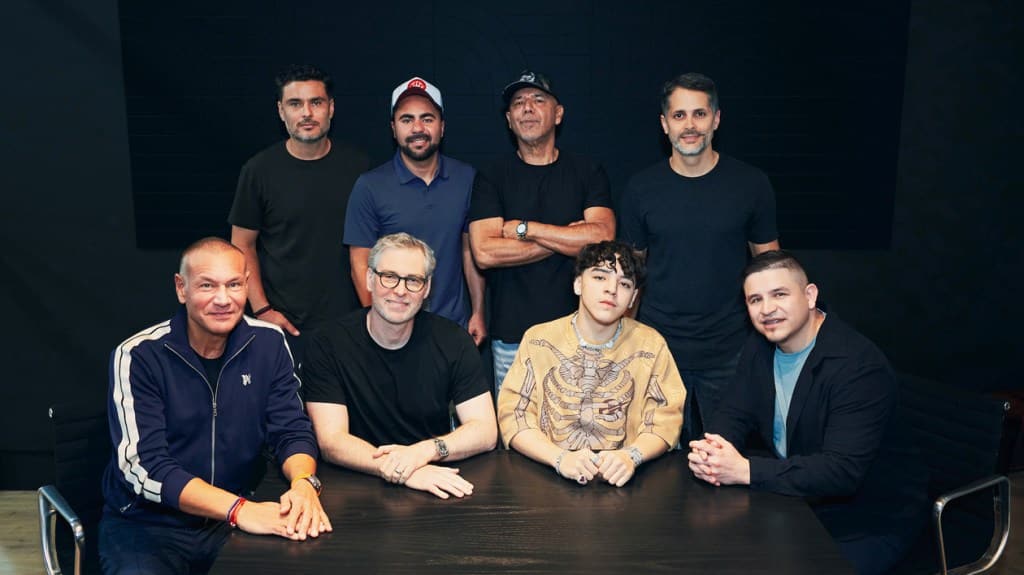Business
Page: 121
Nick Terranova has been appointed senior vp of brand partnerships at Dick Clark Productions (DCP). Based in New York, Terranova will be responsible for developing brand alliances across all media platforms for the production company’s many award shows (Golden Globes, American Music Awards, Billboard Music Awards and Academy of Country Music Awards) and other programming, such as Dick Clark’s New Year’s Rockin’ Eve with Ryan Seacrest.
Terranova brings more than 15 years of experience in media, advertising, and partnerships to the role. Prior to joining DCP, Terranova held senior leadership roles at Fox and Warner Bros.
As svp, ad sales & brand partnerships at Fox, Terranova oversaw the national sales team and led the transition of TMZ’s advertising business following its acquisition from WarnerMedia, contributing to double-digit revenue growth across digital, social, and branded content platforms.
Trending on Billboard
Prior to Fox, Terranova held key sales leadership roles during his 12-year tenure at Warner Bros., managing numerous advertising portfolios for premium entertainment properties such as Rotten Tomatoes, Flixster, TMZ, Ellen DeGeneres, Extra, and DC Comics—brands that together formed Warner Bros. Digital Media. His work spanned direct and programmatic sales, branded content, and on-air product integrations.
Terranova began his career in media at OMD as a national TV buyer before moving to ad sales at Turner and CBS Interactive. Most recently, he served as svp of sales at Anoki, an AI-driven CTV startup.
The 60th ACM Awards, hosted by Reba McEntire, is set for May 8, live from Ford Center at The Star in Frisco, Texas. The American Music Awards will return following a two-and-a-half-year hiatus over Memorial Day weekend. The show, live from Las Vegas, will include a tribute to America’s veterans.
DCP is owned by Penske Media Eldridge, a Penske Media Corporation (PMC) subsidiary and joint venture between PMC and Eldridge. PMC is the parent company of Billboard.
HipHopWired Featured Video
Megan Thee Stallion turned 30 over Valentine’s Day Weekend and looked stunning doing so as we were privileged to witness via social media. The Houston Hottie herself is now expanding her business portfolio by way of her new tequila brand, Chicas Divertidas.
Announced on Megan Thee Stallion’s birthday (Feb. 15), Chicas Divertidas aims to be more than a celebrity tequila brand and is produced and sourced at Casa Centinela (NOM 1140), which has been distilling the famed Mexican spirit for over 120 years. As with all tequilas, the juice is made from 100% Blue Weber agave as legally mandated by the Consejo Regulador del Tequila (CRT) and can only be made from the plant in one of the designated regions in the country.
Hot Girl Meg is known as someone who enjoys a good beverage responsibly and shared her vision of Chicas Divertidas with her legion of fans.
“As someone who values good vibes and great memories, I knew I wanted to create a tequila that was designed to be shared and savored with my Hotties,” Megan shared in a statement. “Smooth, sultry, and premium. This process has been years in the making, and I’m so proud to take this next step in my journey as an entrepreneur and launch this brand. I know the Hotties are ready, it’s time to give them a drink made by me! I’m excited to share this labor of love with you all and hope you are inspired to enter your CHICAS ERA!”
Currently, Chicas Divertidas is offered in Blanco (SRP $70), which is unaged tequila that can be either sipped with meals or mixed and Reposado (SRP $80), which means “rested” and is a slightly aged version of tequila that can be sipped or make an excellent base for an Oaxacan Old Fashioned.
There is a presale link for Chicas Divertidas ahead of its wider national distribution, which can be found here.
Congratulations to Megan Thee Stallion.
—
Photo: Chicas Divertidas Tequila
Ole Obermann, the long-serving global head of music business development, is leaving the company. Tracy Gardner will step into the role after his departure at the end of March.
“I am proud to have played a role in bringing so many people the joy of music while at TikTok,” Obermann wrote in a note to staff on Tuesday (Feb. 18), according to Music Business Worldwide. “We have an amazing team,” he continued, “and leadership and music will continue to thrive and evolve on TikTok.”
A representative for TikTok declined to comment.
Trending on Billboard
Obermann started at TikTok in 2019. Before that, he spent three years at Warner Music Group as chief digital officer/evp, strategy and business development, and a decade at Sony Music, where he worked on licensing renewals with Spotify, Apple Music and YouTube, as well as deals with Facebook and many other digital services. Gardner also worked at WMG prior to joining TikTok.
During Obermann’s time at TikTok, the platform grew rapidly and became a major conduit for music discovery, changing the ways that artists made and marketed songs, and the ways that labels signed and promoted artists.
As TikTok grew, it also evolved from its roots as a dance-focused app for younger users. “Even though it’s been a bunch of years since we morphed from Musical.ly to TikTok, there is still, in some communities, this misconception that the artist needs to get out there and do a dance to their song, and then it’s going to go viral,” Obermann said last year.
For the music business, Obermann often served as the TikTok’s public face. TikTok’s relationship with the industry was tense for much of 2024: There was a monthslong standoff with Universal Music Group before the two parties came to a licensing agreement.
“There was obviously a value conversation: What are the payments that are happening, and also how much marketing and promotion can we provide to help with the discovery of new music or new artists that are priorities for them?” Obermann explained last year. “So that was one thing that we were wrestling over, and we ultimately got there.”
Shot Tower Capital, a boutique investment brand specializing in the sale of music and entertainment assets, is enhancing its offerings through the launch of RedBrick Advisors, a specialized valuation firm catering to those industries. Sachin Saggar Courtesy Photo As part of that new endeavor, Shot Tower is partnering with RedBrick co-founder Sachin Saggar, a research […]
Nashville-based label Big Machine Label Group, a subsidiary of HYBE America, has appointed Jodi Dawes to the role of vice president of publicity and communications, to oversee the label group’s public relations department and lead strategy across BMLG’s imprints Big Machine Records, The Valory Music Co. and Nashville Harbor Records & Entertainment. Dawes reports directly […]
Rising música mexicana star Xavi has signed a management deal with WK Entertainment, Billboard Español can exclusively announce Tuesday (Feb. 18).
The Latin music management firm — home to superstars Carlos Vives, Maluma, Emilia, and more — and helmed by CEO/founder Walter Kolm, is expanding its superstar roster with the inclusion of Xavi, 2024’s breakout star.
“Xavi is a once-in-a-generation talent whose artistry is reshaping música mexicana,” said Kolm in a statement. “His success so far is just the beginning, and we are honored to welcome him to the WK family. With our team’s expertise and global reach, alongside Nir and his team at Interscope, we look forward to taking his career to even greater heights.”
Trending on Billboard
“I’m excited for this new stage with the new addition to my team,” added Xavi.
Known for his signature tumbados románticos and an unmatched voice, the Mexican-American singer-songwriter has captivated a new generation of listeners. His hit “La Diabla” not only topped the Hot Latin Songs chart but also tied for the second-longest reigning title of the year, dominating for 14 weeks. Additionally, “La Víctima,” Xavi’s first chart entry, reached an impressive No. 2 peak. Additionally, the star reached No. 1 on the Year-End Top Latin Artist – New chart. Xavi signed with Interscope Records in 2021.
“We’re thrilled to welcome Walter and his incredible team to Xavi’s universe,” added Nir Seroussi, EVP of Interscope. “As Xavi continues to push boundaries and reach new audiences, together we will help solidify his status as one of the most influential artists in Música Mexicana today and beyond.”
WK Entertainment is also teaming up with with Fabio Gutierrez, Xavi’s father and manager, and Latin Lifestyle Entertainment, the company that has been pivotal in developing Xavi’s career from the start. “I’m very excited about this great opportunity to work hand in hand with WK and help take Xavi to the next level in his career! I’m very grateful for everything that is happening at the moment,” Gutierrez added.
Moreover, Xavi’s booking agency, WME, will maintain its role in managing his touring, brand partnerships, and film projects in conjunction with WK and Latin Lifestyle.
AEG Presents has promoted Andrew Klein to president of global partnerships, where he will oversee all sales and activation efforts for the company. Reporting to executive vice president and COO Shawn Trell, Klein will continue to be based in New York.
Previously serving as senior vp of global partnerships, Klein has been a key figure in sponsorship sales at AEG for over two decades.
Klein has played an instrumental role in developing major sponsorship deals across AEG’s tours, festivals and venues. His work includes securing partnerships for high-profile events such as Stagecoach Festival, Camp Flog Gnaw and the New Orleans Jazz Fest & Heritage Festival. Known for his expertise in integrating brands with music experiences, he has spearheaded successful collaborations, including H&M’s global licensing deal with Coachella and tour sponsorships for Justin Bieber, Xbox, Ubisoft, Motorola and Katy Perry with Staples.
Klein was also ahead of the curve on live streaming, leading early broadcasts for the AT&T Blue Room with New Orleans Jazz Fest, Coachella and the Mile High Music Festival. More recently, he facilitated high-profile streaming deals, including partnerships between YouTube and Coachella and Amazon with Stagecoach, further expanding AEG’s reach in digital entertainment.
Trending on Billboard
Pre-AEG, Klein served as president of EMCI, a New York-based music sponsorship and activations firm. While there, he managed sponsorship programs for major events such as the original Lilith Fair and helped orchestrate brand collaborations, including partnerships between Tommy Hilfiger and Sheryl Crow, Shania Twain with Gitano Jeans and the Rolling Stones with Sprint.
“The opportunities in our company have never been more exciting or abundant for driving meaningful results for our partners,” said Klein. “I look forward to continuing to develop and implement innovative programs that amplify our world-class brand partners and industry-leading music assets.”
Trell praised Klein’s ability to cultivate relationships and “identifying brands and partners to bring critical value and expanded reach across our entire portfolio.”
The civil lawsuit accusing Jay-Z (Shawn Carter) of raping a 13-year-old girl alongside Sean “Diddy” Combs in 2000 has been voluntarily dismissed, according to court documents filed on Friday (Feb. 14).
“Today is a victory. The frivolous, fictitious and appalling allegations have been dismissed,” Carter wrote in a post on Roc Nation’s official Instagram account. “This civil suit was without merit and never going anywhere. The fictional tale they created was laughable, if not for the seriousness of the claims. I would not wish this experience on anyone. The trauma that my wife, my children, my loved ones and I have endured can never be dismissed.”
The case was dismissed with prejudice against all defendants, meaning it cannot be refiled.
Filed in New York federal court in December, the complaint alleged that Carter and Combs drugged and assaulted the Jane Doe plaintiff during an after-party following the MTV Video Music Awards. The case arrived as an updated version of a previous lawsuit filed against Combs only.
At the time, Carter called the lawsuit a “blackmail attempt” designed to result in a settlement. He further called the Jane Doe’s attorney, Tony Buzbee — notable for filing a slew of sexual assault lawsuits against Combs — a “fraud,” a “deplorable human” and an “ambulance chaser in a cheap suit.”
In his Instagram post on Friday, Carter took further aim at Buzbee, writing, “This 1-800 lawyer gets to file a suit hiding behind Jane Doe, and when they quickly realize that the money grab is going to fail, they get to walk away with no repercussions. The system has failed.
“The court must protect victims, OF COURSE, while with the same ethical responsibility, the courts must protect the innocent from being accused without a shred of evidence. May the truth prevail for all victims and those falsely accused equally.”
In a statement sent to Billboard, Carter’s attorney, Alex Spiro, said the following: “The false case against JAY-Z, that never should have been brought, has been dismissed with prejudice. By standing up in the face of heinous and false allegations, Jay has done what few can — he pushed back, he never settled, he never paid 1 red penny, he triumphed and cleared his name.”
“Today’s complete dismissal without a settlement by the 1-800 attorney is yet another confirmation that these lawsuits are built on falsehoods, not facts,” said a lawyer for Combs in a statement. “For months, we have seen case after case filed by individuals hiding behind anonymity, pushed forward by an attorney more focused on media headlines than legal merit. Just like this claim, the others will fall apart because there is no truth to them. Sean Combs has never sexually assaulted or trafficked anyone—man or woman, adult or minor. No number of lawsuits, sensationalized allegations, or media theatrics will change that reality. We will continue to fight these baseless claims and hold those responsible. This is just the first of many that will not hold up in a court of law.”
Buzbee declined to comment on the dismissal.
This story was updated to add statements from Carter and Combs’ attorneys.
For more than a year, record labels and publishers have seen investors pour into streaming stocks — namely Spotify — while downplaying the potential benefits rights owners will accrue from rising subscription prices. Now, Universal Music Group (UMG) and Warner Music Group (WMG) are getting some attention as analysts are optimistic about the terms of new licensing agreements Spotify reached with the companies.
WMG shares rose 10.9% to $36.20 a week after the company released fiscal first-quarter results. This week, the stock got a boost when Citi raised its WMG price target to $42 from $34 and upgraded the stock to a “buy” rating from “neutral.” As Morningstar explained last week, WMG is a “primary beneficiary of the ongoing growth” in the music industry. At $36.20, WMG shares have gained 17.0% in 2025 and are only slightly below their 52-week high of $36.64 set in February 2024. WMG shares fell 13.4% in 2024.
Trending on Billboard
At UMG, shares rose 7.1% to 28.89 euros ($30.32), the stock’s highest closing price since May 27, 2024. Morgan Stanley analysts have been making the case that UMG is undervalued given Spotify’s soaring share price and this week raised its UMG price target to 42 euros ($44.07) from 36 euros ($37.78). Recent licensing deals with Spotify and Amazon “increases our confidence that its subscription growth will accelerate” from approximately 5% at the start of 2025 to “closer to 15%” at the beginning of 2026, they wrote in a Monday (Feb. 10) investor note. After falling 4.2% in 2024, UMG shares are up 20.8% in 2025.
WMG and UMG were among the best performers on the 20-company Billboard Global Music Index (BGMI) this week. The BGMI rose 4.6% to a record 2,755.53, bringing its year-to-date gain to 29.7%. Only two stocks lost ground while one was unchanged and 17 posted gains for the week. The index outperformed the Nasdaq composite (up 2.6%), the S&P 500 (up 1.5%), the FTSE 100 (up 0.4%), China’s SSE Composite Index (up 1.3%) and South Korea’s KOSPI composite index (flat versus the previous week).
Live Nation reached an all-time high of $152.94 on Friday (Feb. 14) before closing at $153.76, up 3.7% for the week. Ahead of the concert promoter’s earnings results on Thursday (Feb. 20,) Wolfe Research increased its price target to $175 from $160 and Goldman Sachs raised it to $166 from $148.
Streaming services fared well, too. Spotify rose another 2.4% to $637.73 and reached a new all-time high of $652.63 on Thursday (Feb. 13). Fewer than seven weeks into 2025, Spotify shares have gained 36.7%. Elsewhere on the streaming front, Cloud Music rose 9.1% to 142.20 HKD ($18.01) and Tencent Music Entertainment gained 8.7% to $13.63.
Music streamer LiveOne had the week’s biggest loss after falling 20.5% to $0.93. On Thursday, the company announced that its revenue fell 6% in the fiscal third quarter. LiveOne also lowered revenue and earnings guidance for its full year, causing shares to end the day down 18.6%. The other streaming loser was Abu Dhabi-based Anghami, which fell 2.7% to $0.71.
Satellite radio broadcaster SiriusXM shares rose 6.6% to $27.11, bringing its year-to-date gain to 21.2%. This week, Deutsche Bank raised its price target to $27 from $25.
Most K-pop companies finished the week in positive territory. HYBE shares rose 5.8% and reached their highest mark since July 2023. SM Entertainment, which reported a 9% increase in revenue this week, increased 5.4%. JYP Entertainment improved 4.2% and YG Entertainment fell 1.3%.
There’s a new category at the Juno Awards this year and for first-time nominee Lowell, it’s been a long time coming.
Lowell (Elizabeth Lowell Boland) has been in the industry for a decade, first as a performing artist and then as a songwriter and artist development expert. In the last two years, she’s helped break Canadian rockers The Beaches internationally and contributed to Beyoncé‘s first-ever album of the year win at the Grammys, co-writing several tracks on Cowboy Carter.
Now, she receives her first-ever Juno nomination, in the inaugural year of the new songwriter of the year (non-performer) category. The introduction of the category means that behind-the-scenes songwriters who would normally get squeezed out of the songwriter of the year category by big names like Abel Tesfaye (a.k.a. The Weeknd) are getting their due.
Last year, Billboard Canada and SOCAN introduced the Billboard Canada Non-Performing Songwriter Award, which Lowell won and accepted at the Billboard Canada Power Players celebration. Lowell was a fitting first winner, as she’s also been pushing the Junos to add the category for years.
Trending on Billboard
At a Junos media conference this week following the nominations announcement, Lowell spoke about how it’s been a long road to get here, but that songwriters are starting to get some recognition.
“I’m so glad that we have this category now,” Lowell said. “I think that if it didn’t exist I probably wouldn’t be nominated at the Junos — and I always said if I get Grammys before I get Junos you know there’s something wrong.”
Lowell added that in the past, Juno nominations have been bittersweet for songwriters.
“Usually we see a lot of artists that we maybe have developed or written their hits, but know that our name won’t be up there, just kind of having to live in it,” she reflected. “I’m a fighter so I kind of took the lead on it. One thing about songwriters is we’re so used to just being walked all over, we don’t often think we can do anything about it, and I refuse to think that way.”
As songwriter royalties have declined, it’s harder to make a living, Lowell pointed out, making this kind of recognition even more significant.
“All of these labels — Universal Canada, Warner Canada — we could be in L.A. but we’re here, we’re working on your artists, and we’re writing you guys hits and we’re bringing you money and allowing you to sign more artists, so the respect that we need and have earned needs to be at the Junos too,” she continued. “And here we are. It’s good — it’s a good day.”
She’s excited to be nominated in the category alongside Nate Ferraro, her songwriting partner on Beyoncé’s “Texas Hold ‘Em.” Also nominated are Evan Blair, for work with Maren Morris and Benson Boone (including co-writing the No. 1 hit “Beautiful Things”); Shaun Frank, for work with Dua Lipa and Morgan Wallen; and Tobias Jesso Jr., for work with Camila Cabello, Morris and Lipa.
Producer Aaron Paris and recording engineer/producer Hill Kourkoutis also spoke about the importance of industry recognition for those working behind the scenes. Read more here. – Rosie Long Decter
≈
Junos and Polaris Prize Release Statements on Buffy Sainte-Marie’s Awards Following Order of Canada Cancellation
Though most focus was on the new Juno nominees this week, one prior winner was also under the spotlight: Buffy Sainte-Marie.
The acclaimed singer-songwriter’s Order of Canada appointment was canceled last week by The Governor General of Canada, Mary Simon. The decision came a year and a half after the CBC’s investigation into her claims of Indigenous ancestry and Canadian citizenship. Since then, there has been scrutiny into other awards Sainte-Marie has earned in the country.
CARAS, the body that governs the Junos, released a statement, saying they are aware of the decision to terminate her Order of Canada.
“We continue to consult with our Indigenous Music Advisory Committee and Indigenous stakeholders on how to best proceed as it relates to Sainte-Marie’s Juno Awards,” the organization said in a statement. “We recognize the importance of Indigenous music as a category and remain deeply committed to promoting, celebrating and honouring the contributions of Indigenous artists to the Canadian music industry.”
In 2023, a group named the Indigenous Women’s Collective called on CARAS to rescind Sainte-Marie’s 2018 Juno for Indigenous album of the year, which she won for the album Medicine Songs. The group pointed to the win over artist Kelly Fraser, who died a year later.
“We invite the Juno Awards Committee to revisit this 2018 category and explore ways of righting a past wrong,” they wrote. “All Indigenous Artists in this 2018 category, including Kelly Fraser, should be reconsidered for this rightful honour.”
Sainte-Marie won the Polaris Music Prize, which awards one album as the best in Canada of the year based solely on artistic merit, for her 2015 album, Power in the Blood. For her victory, Sainte-Marie earned a cash prize of $50,000.
The Polaris Music Prize Board released a statement.
“The Polaris Board is aware of the ongoing conversation around Buffy Sainte Marie’s Canadian status,” they said in a statement. “We have and continue to follow as new information is shared.”
Sainte-Marie has said that she has never lied about her identity. – Richard Trapunski

 State Champ Radio
State Champ Radio 










